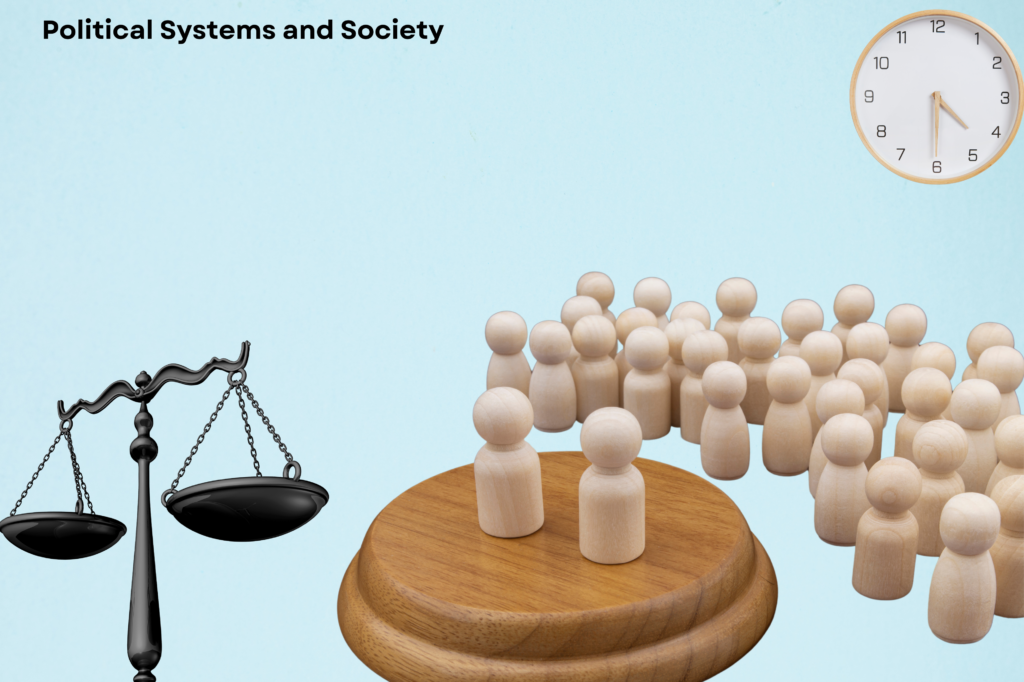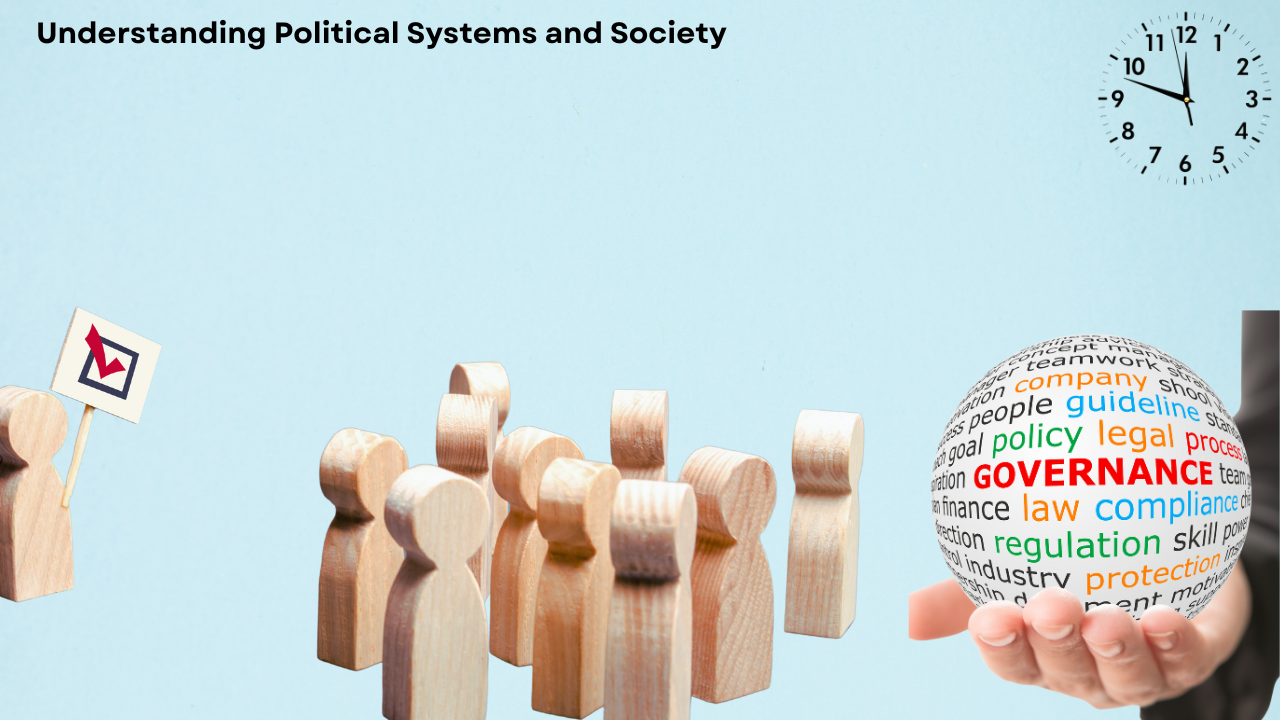Studying society and politics helps us understand how politics affects society and how society affects politics. Politics is necessary to run governments, make laws, and handle resources. Sociologists study these processes to determine how societies are put together, how governments deal with people, and how power works. To understand how societies work and change over time, we need to know how government systems work.

What Is a Political System?
It is interesting to see how politics and culture affect each other. Politics helps run a country by making rules and handling resources. Sociologists study various topics to understand how people live together in groups, how states treat people, and how power works in society. Understanding how cultures work and how they change over time is essential.
Types of Political Systems
It is possible to find different kinds of government systems. As an example, a democracy lets everyone vote and help make choices. Within this kind of government, power is held by one or a few masters. Because these methods are mixed up in some places, people have little say over government programs. It is what sociologists study: how do these systems affect everyone’s freedom, fairness, and social justice?
Democracy and Society
When people live in a democracy, they have the right to vote and choose their leaders. Freedom of speech, equality, and involvement are significant in a democracy. Sociologists study democracies to learn how people’s political participation changes society. They look at how elections work, how people voice their views, and how government policies reflect what people want and need.
Authoritarianism and Its Impact
This type of government is called authoritarian when only a few people or one boss have power. Sovereign governments control many parts of others’ lives, making it harder for them to protest and speak freely. Socialites study dictatorships to discover how power is kept and how people live with these leaders. They help show how lies, fear, and control can help the government stay in power and transform society.
Power and Authority in Political Systems
In political sociology, power and control are fundamental ideas. Power is the power to make choices that affect other people’s lives or to sway their opinions. People have authority when they have the legal right to use power, usually given by laws or constitutions. Sociologists study how society’s power is distributed, who is in charge, and how this affects people’s lives and social situations.
Social Movements and Political Change
People often start social movements as a reaction to political systems that they think are unfair or hard to live with. People can question how the government works by joining movements for civil rights, women’s right to vote, or environmental protection. Sociologists study these groups to determine how they start, grow, and change society. They also examine how governments deal with these problems and whether these movements naturally change politics.
The Role of Political Parties
In democracies, political parties are significant. They run for office against each other in elections and have different ideas and policies. Sociologists examine political groups to see how they show societal differences based on race, class, or religion. By examining the role of political parties, sociology helps us understand how groups in society try to be heard and change government choices.
The Relationship Between Politics and Economics
There is a close connection between political and business systems. Governments set tax rates, regulate businesses, and run public services, affecting the economy. Sociologists study how politics and economics affect each other to determine how resources and wealth are shared. They also look into how political systems can worsen economic inequality or make it less of a problem.
Citizenship and Political Rights
Citizenship is the legal status of a person in a government system that gives them certain rights and tasks. People have many rights, such as freedom of speech, voting, and utilizing public services. A sociologist’s job is to find out who is a citizen and who is not so they can run the government. Researchers look at how migration, race, gender, and class can change people’s political rights and how citizenship can change people’s social roles.
The Role of Government in Social Policy
Government policies affect many parts of society, such as healthcare, schooling, and environmental protection. Sociologists study how government systems make and enforce social rules and how these rules affect various social groups. By knowing what the government does regarding social policy, we can see how political choices affect social justice, economic equality, and daily life.
Political Ideologies and Society
Ideologies in politics are ways of thinking about how society should be run. Liberalism, conservatism, socialism, and communism are all examples of this. These ideas affect the way political systems work and the rules they make. Sociologists study political ideas to find out how they change people’s beliefs, actions, and hopes of their government. Politics and ideas about politics can also affect how people argue and solve issues.
Politics and the media
The media is essential for shaping both politics and general opinion. The news, social media, and political comments can change people’s views on political events, leaders, and policies. Sociologists study how the media affects politics and how it spreads knowledge. They also look at who runs the media and how it changes politics. Biases in the media can also influence elections and general opinion.
Political Systems and Globalization
Globalization has linked the world’s markets, cultures, and government systems. Some studies have examined how issues affecting many countries, like climate change, foreign organizations, and trade agreements, impact political systems. As nations work together to solve problems they all face, they also look at how globalization changes countries’ power. Knowing how politics works in a world that is becoming more connected helps us understand how world countries work.
Corruption in Political Systems
There is a lot of crap in many government systems. It happens when the government uses its power to achieve what it wants instead of helping people. Criminologists examine how crime happens, who gains, and how it alters society. People lose trust in the government when it is dishonest, which can cause social unrest and unfair treatment of some groups. Sociologists study corruption to help people figure out how to eliminate or cut it down.
Political Systems and Social Control
Political systems help things and people stay in line. They keep people safe, and society has laws and ways to ensure they are followed. When governments make laws to keep things going smoothly, sociologists examine how these laws can worsen social differences. There may be disagreements about what is fair and just in a democracy when some rules affect certain races or economic groups more than others.
The Influence of Religion on Political Systems
In the past, faith has dramatically affected how governments work. Some places have a close link between religion and politics, with religious views affecting laws and decisions made by the government. The two have been kept different in some places. Sociologists study how religion affects politics, such as how it changes voting habits and public policies. They also examine how faith groups use politics to change or keep things the same.
Conclusion
Sociology can help us understand how governments work and how they impact people’s lives. It examines how laws, social groups, power, and authority are linked. It helps us understand how politics touches our lives. The story shows how hard governance can be, how social forces matter, and how society can change. You need to understand how governments work to resolve problems, make political structures more fair, and include everyone. Sociology is the key.
